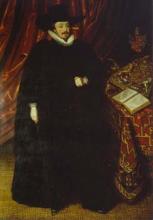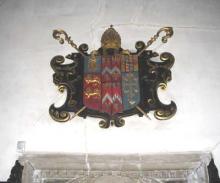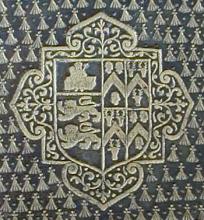John Williams (1582-1650)
John Williams, Bishop of Lincoln, and later Archbishop of York, is one of the key figures in the Library's history, having largely financed the building of what is now the Old Library. Born in Aberconwy he attended school in Ruthin before graduating from St John's in 1601, and taking his MA in 1605. He entered the clergy and began to rise through the ranks of ecclesiastical preferment, attracting the notice of King James. In 1620 he gained the position of Dean of Westminster, which provided him with a base in London close to the court and political power. His political acumen was shown when he gained the position of Keeper of the Great Seal from the King in the following year. He could, however, over-reach himself as when he attempted to gain the Bishopric of London, and instead ended up becoming Bishop of Lincoln, a posting which nearly removed him from London and political influence. Throughout his period of office as Keeper he was identified with King James, and did his future prospects no favours when he showed no enthusiasm for the disastrous expedition to Madrid, led by the Prince of Wales and the Duke of Buckingham. When James died Williams was quickly removed from office, and prevented from attending Parliament. Even after Buckingham's execution Williams remained out of favour and in 1636, after a protracted legal battle in the Star Chamber, originating with Williams's liberal attitudes to the puritans, he was suspended from his benefices, fined and imprisoned in the Tower until 1640, when the Lords forced the King to release him. Williams resumed his offices and tried to steer a course between the extreme wings of the Church. He was re-imprisoned by Parliament in 1641, but when released on bail in 1642 headed straight for Yorkshire to be with the King, and to be enthroned as Archbishop of York. His stay in Yorkshire was brief, however, and he spent the last years of his life in his native north Wales, initially supporting the royalist cause, but eventually coming to an accommodation with the local parliamentarian commander in 1646. He died of quinsy whilst staying with his kinsfolk, the Wynns of Gwydir.
Williams and St John's College Library
Williams endowed several libraries during the course of his career, at Westminster School, at his palace at Buckden, and at St John's, where he responded to an appeal from Valentine Carey, his cousin and a Fellow of St John's, to provide funds for a building to accommodate William Crashaw's books, which the Library had recently acquired (for a fuller description of this see the History of the Old Library). He also sought to provide books for the new Library, and to this end, in 1632, promised to buy books to the value of £100 annually for the Library, over a period of ten years. Gaining actual possession of Williams's books proved very difficult for St John's, however. During Williams's detention in the Tower, a man named Kilvert gained control of his study at Buckden, and while he was in charge books intended for St John's went missing. Eventually they came to the College for a brief period, but on Williams's rehabilitation in 1640 he requested their transfer to Westminster, and later still in 1648-9 he required some to be brought to him in Wales. After his death the College attempted to recover the books, but found that they were in such poor repair, or were duplicates of items it already held, that it sold most of them off, realising over £380. Consequently the Old Library has a limited selection of items that bear Williams's provenance. Such books as there are cover a wide variety of subjects. Many are concerned with contemporary doctrinal theology, forms of prayer and ecclesiastical debates, but there are also anatomical, mathematical, classical and linguistics texts. Perhaps the most important item among those to which his provenance has been attributed is a hand-coloured issue of the Great Bible of 1539 printed on vellum, one of two produced for Henry VIII and Thomas Cromwell (the St John's copy is traditionally associated with Cromwell). Other volumes show Williams's links with the scholars of his time, bearing donative inscriptions to him from their authors. Among these are a presentation copy of an extended Latin edition of Francis Mason's Of the consecration of the bishops in the Church of England (1625), given to Williams by the editor, Nathaniel Brent, and finely bound to include Williams's arms (illustrated below), and a copy of Utriusque cosmi maioris scilicet et minoris metaphysica, physica atque technica historia (1617), a lavishly illustrated work covering cosmology, geometry, mechanics and music theory by the alchemist Robert Fludd, which bears a handwritten epistle to Williams from Fludd on its front flyleaf.
Provenance markings
Although the Great Bible bears no physical evidence of having belonged to Williams, most volumes associated with him do, having his arms stamped in gilt on both covers (below). In one case this stamp has been incorporated into an ornate gold-tooled binding. Williams's arms also hang at the eastern end of the Upper Library, above the original entrance, and are central to the Oriel Window at the western end.


